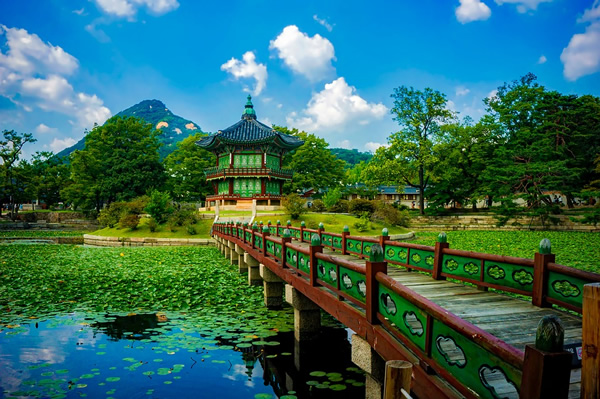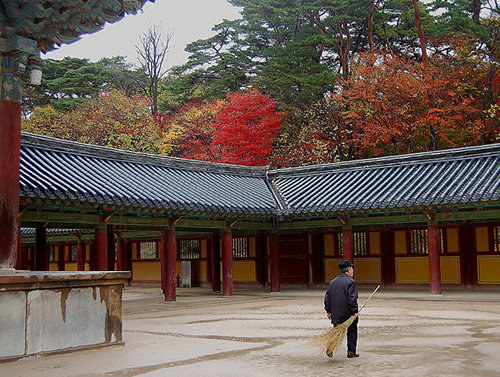A Guide to Teaching English in South Korea with EPIK
What it's Like to Live as a Teacher
By Eileen Han
 |
| Gyeongbokgung Palace in South Korea. |
One option for anyone considering teaching English in South Korea is the EPIK program. This government-sponsored program recruits native English speakers from English-speaking countries to teach on a 1-year contract. (The contract is renewable up to 3 years). The required bachelor's degree need not be in English or Education, nor is previous teaching experience required; however, having these qualifications may make your experience smoother.
Applying
To complete the application process, I had to apply at the nearest Korean Embassy, which was in Los Angeles. I was interviewed by a middle-aged Korean government worker who spoke limited English and seemed so pleased with my B.A. degree from UCLA and 1-year substitute teaching experience that the interview was more a formality than a challenging interview. He also interviewed me with his shoes off — not to imply that the process or this government worker was unprofessional. In Korea, the custom indoors of a house, or even school, and sometimes the office, is to remove one's outdoor shoes and don slippers.
The EPIK Program
The program consists of co-teaching at designated schools in the municipality you are assigned to and teaching English workshops to Korean English teachers of the city. When I participated, the pay was about 25 million won yearly, a little more than two million won monthly, plus a rent-free furnished apartment. Two million won is a little less than $2,000. Considering the cost of living in Korea, this was comfortable.
The EPIK Orientation
in South Korea
The contract begins with a 10-day orientation at a remote conference site. I attended workshops, ate cafeteria meals, and took short trips with 60 other native speakers hired from the U.S., Canada, England, Ireland, New Zealand, and Australia. The workshops were crash-course training in teaching English in Korea. The orientation allowed me to form friendships that made the rest of my year in Korea more fun. I visited my orientation friends throughout the year, and we sometimes took vacations together.
My orientation included many second-generation Koreans from America, Australia, and Canada. My orientation also included a college undergraduate who had doctored his application to get into the program, causing one meal to be interrupted by the EPIK officials taking him away and deporting him back to America. There was also a Canadian whose odd behavior prompted suspicion among many, who, upon further investigation, concluded he may have been running from Canadian law. Someone brought the matter to the attention of the EPIK administrators, who then took it into their hands to investigate further.
At the end of the orientation, EPIK provided our assignments and told us in which town we would be living. I was offered my second choice: Kumsan, a rural village in the Chung-Cho-Nam-Do province, three hours south of Seoul. Being from Los Angeles, I feared what the accommodations might be like in the Korean countryside. I have no regrets now; my experience changed my whole perspective.
 |
| A peaceful temple in South Korea. |
Following the initial orientation, there was a 3-day orientation in Taejun, the principal city of the Chung-Cho-Nam-Do province, attended by all recruits placed in this province. We were put up in a hotel and treated to restaurant meals, meetings with education officials, and more workshops. There were seven of us at this orientation. Finally, EPIK took us to our home for the coming year. In the town we were assigned, we met the officials at the education office and our host teacher. From this point on, individual experiences vary greatly.
Housing
The housing situation was interesting but manageable. My apartment was a 1-bedroom on the second floor of a 3-story building at the edge of the town. It was furnished with a dining table, chairs, bed, wardrobe closet, blankets, dishware, and pots, and had a bathroom and kitchen. It was about 200 square feet. The heater worked by heating the floor; it could get hot in that tiny space during the cold winter. The bathroom had a toilet, sink, mirror, and washing machine but no separate shower space; a shower hook was attached to the wall, and a removable shower head hung from it. The water would wash through the drain in the middle of the tiled bathroom floor. It was the most maximized use of space I had seen. There was hot water and decent water pressure, and the bathroom was easy to clean.
The Teachers
The host teacher is a Korean English teacher. Some host teachers volunteer to their supervisors to do this duty, while others are assigned to it begrudgingly. My host teacher commuted from Taejun, a 1-hour drive every morning and evening. She had a full schedule of classes and wanted to do the bare minimum to assist me. She also spoke very limited English and often seemed to pretend to understand me, all the while frustrated by the pressure of saving face among her peers due to her inability to understand a native English speaker. I quickly learned to speak to her only when I had to. If you go to a foreign country to teach English, you need to accept that you will not change their cultural mores and attitudes: it is ignorant and naïve to think you can and arrogant to think you should.
I fell into the company of teachers who were more welcoming. An art teacher at a school where I co-taught invited me to a teacher's union meeting, which met every Thursday night in Kumsan. The teachers' union in Korea consisted of the more politically active, whose members were part of the pro-democratic protests of 1988-89 or supported them. They believe in labor laws, a peaceful reunification of the two Koreas, and education reform. Every Thursday, they held a meeting with the administrators of the education office. Afterward, they would socialize over dinner and drinking; this was the part they invited me to. The first night I met them, we drank soju (a rice whiskey), ate three-layered pork, barbecued at the table, dipped in hot red bean paste, sesame oil, and salt, and wrapped in lettuce with green onions and garlic. They discussed education reform and politics. After eating, a teacher recited a national poem to strengthen his point. Another followed by singing an old folk song. It had the Beatnik aura of bohemianism familiar from Jack Kerouac's novels of people desiring a revolution or a major social change. Their passion was infectious. The group invited me to many outings throughout my stay in Korea. An elementary school teacher in the group who had studied English for a few years in Ohio did much of the translation for me.
The Students
The cultural attitude toward teachers in Korea is respectful, and students will often bow to teachers in the hallway. Try a different method if you have to pull teeth in a classroom to get students to speak. I used group activities in which students could participate non-verbally and where verbal participation was gradually built up through 1-word answers before becoming complete phrases. The better my teaching experiences went, the less frustration I felt.
Teaching in Korea can be a wonderful experience. As a spa fanatic, I loved my jogs to the Ginseng Hotel, where I would soak in the public bath's ginseng spa. (Public baths are shared in Korea and separated by gender.) I ate delicious meals at charming restaurants dotted along the countryside. There was a coffeehouse where I would enjoy various teas in a cottage resembling a mushroom, wallpapered inside with American classic rock album covers. Then there were the people: the teachers from English-speaking countries, most at a turning point in their lives, either wanting a change from their current work, or from no job, or looking to reconnect to their parents' motherland. And there were the local people: the Korean English teachers who wanted to spend time with native English speakers to practice their English and understand American culture; for many of them, it's a culture they know only through movies, books, and articles. And the people, amidst the chance, circumstance, and change, you may find friends, which can make the experience of teaching English in Korea also an experience in living and learning.
For more information see English Program in Korea (EPIK).
Eileen Han currently does contract work in ESL for the Department of Education in Pennsylvania.
|
